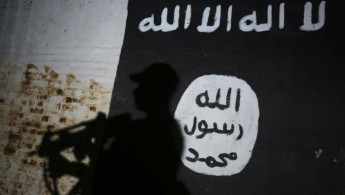Eastern Libyan forces claim local IS leader killed in raid
The IS self-declared 'emirate' in Libya, fell to government forces in 2016.
2 min read
IS controlled the Libyan coastal city of Sirte [Getty]
A Libyan Islamic State group commander was been killed in a raid by eastern forces in the south of the country earlier this month, Reuters has reported.
The self-described Libyan National Army militia, headed by warlord Khalifa Haftar, named Abu Moaz Al-Iraqi - also known as Abu Abdullah Al-Iraqi - as killed in the raid in the city of Sebha early September.
The local IS leader is also known as Abdul Qader al-Najdi or Abu Muaz Al-Tikriti.
Eight other militants were killed in the raid and identified later, the LNA spokesperson Ahmed al-Masmari claimed, although Al-Iraqi's death is yet to be verified by other sources.
Abu Moaz Al-Iraqi entered Libya at the height of the country's civil war in 2014, and was made leader of IS in 2015, after its previous commander was killed in an airstrike.
IS controlled the Sitre from 2015, until government forces - backed by US air strikes - finally captured the coastal city in a bloody battle that ended in November 2016.
The offensive saw parts of Sirte left in ruins after repeated air and artillery strikes attempted to dislodge the militants. Hundreds of government forces were killed and around 2,500 IS fighters left dead in the battle.
IS militants are believed to still operate in remote areas of the country, particularly in the southern desert region.
Fighting between the forces loyal to the UN-recognised Tripoli government and rival eastern authority continues unabated.
The Libyan IS affiliate was part of the larger franchise based in Syria and Iraq and headed by Abu Bakr Al-Baghdadi, until he was killed in a US special forces raid in 2019.
Although the group's self-declared caliphate has been defeated, IS militants continue hit-and-run strikes and bombings in Syria, Iraq, Egypt and other countries.
Libyans rose up against Muammar Gaddafi's rule in 2011, with militias, backed by US airstrikes, overthrowing the dictator and his regime.
Rival militias have been pitched in battle ever since with two administrations in the east and west of the country claiming control of Libya.
The UN-recognised Government of National Accord has been backed by Turkey, while the eastern authority and the LNA is bolstered by support from the UAE, Egypt, France and Russia.
The self-described Libyan National Army militia, headed by warlord Khalifa Haftar, named Abu Moaz Al-Iraqi - also known as Abu Abdullah Al-Iraqi - as killed in the raid in the city of Sebha early September.
The local IS leader is also known as Abdul Qader al-Najdi or Abu Muaz Al-Tikriti.
Eight other militants were killed in the raid and identified later, the LNA spokesperson Ahmed al-Masmari claimed, although Al-Iraqi's death is yet to be verified by other sources.
Abu Moaz Al-Iraqi entered Libya at the height of the country's civil war in 2014, and was made leader of IS in 2015, after its previous commander was killed in an airstrike.
|
|
IS controlled the Sitre from 2015, until government forces - backed by US air strikes - finally captured the coastal city in a bloody battle that ended in November 2016.
The offensive saw parts of Sirte left in ruins after repeated air and artillery strikes attempted to dislodge the militants. Hundreds of government forces were killed and around 2,500 IS fighters left dead in the battle.
IS militants are believed to still operate in remote areas of the country, particularly in the southern desert region.
Fighting between the forces loyal to the UN-recognised Tripoli government and rival eastern authority continues unabated.
The Libyan IS affiliate was part of the larger franchise based in Syria and Iraq and headed by Abu Bakr Al-Baghdadi, until he was killed in a US special forces raid in 2019.
Although the group's self-declared caliphate has been defeated, IS militants continue hit-and-run strikes and bombings in Syria, Iraq, Egypt and other countries.
Libyans rose up against Muammar Gaddafi's rule in 2011, with militias, backed by US airstrikes, overthrowing the dictator and his regime.
Rival militias have been pitched in battle ever since with two administrations in the east and west of the country claiming control of Libya.
The UN-recognised Government of National Accord has been backed by Turkey, while the eastern authority and the LNA is bolstered by support from the UAE, Egypt, France and Russia.





 Follow the Middle East's top stories in English at The New Arab on Google News
Follow the Middle East's top stories in English at The New Arab on Google News
![Israeli forces ordered bombed Gaza's Jabalia, ordering residents to leave [Getty]](/sites/default/files/styles/image_330x185/public/2176418030.jpeg?h=a5f2f23a&itok=_YGZaP1z)

